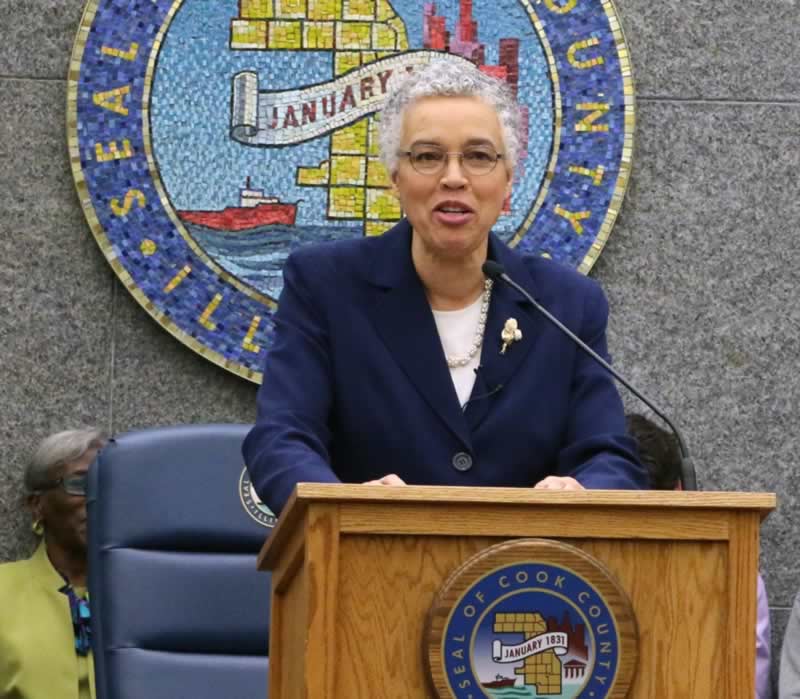
Chicago, IL-(ENEWSPF)- Cook County Board President Toni Preckwinkle today released the report from the Cook County Anti-Harassment Working Group. President Preckwinkle convened the group in October 2018 to review and enhance policies for preventing and prohibiting harassment in the workplace. Her office also conducted a Culture of Reporting Harassment survey, which recorded more than 1,500 responses.
“It is a top priority of my administration to create a workplace where employees and members of the public are treated with respect and support,” President Preckwinkle said. “I am grateful to the Working Group for their contributions to produce this report. The recommendations from the Working Group are thoughtful and practical and we have already implemented some of the action items and are working on the long-term recommendations.”
The Working Group was comprised of a diverse group of external experts in anti-harassment work and staffed by Office of the President (OUP) employees from the Bureau of Human Resources (BHR) and the President’s Office.
The report focused on five broad categories in their results: policies and standard operating procedures; reporting and investigation protocol and processes; training and awareness; workplace culture; and transparency.
The Working Group reviewed the results of OUP’s Culture of Reporting Harassment survey and the Equal Employment Opportunity (EEO) policy, procedures, trainings and communications in order to make recommendations and propose action steps. In addition, the Office of the President researched and reviewed existing local and national best practices to make further recommendations for the Working Group’s consideration.
“I was very pleased to participate in President Preckwinkle’s initiative to address issues of harassment in the County’s workforce. The group included human resource professionals, community leaders, and other representatives of both employees and employers,” said Sherrie Travis, Attorney, Sherrie Travis & Associates LLC. “As a consequence, I believe the group’s final report is comprehensive and even-handed and should give the County’s employees confidence that harassment based on any protected status will not be tolerated.”
“As a member of the working group, I provided insight to ensure that the process is accessible at all stages to individuals with disabilities, including any reasonable accommodations needed, in an effort to remove any barriers to reporting harassment,” said Rachel Arfa, Staff Attorney and PABSS Project Manager, Equip for Equality.
Below are a few key recommendations made by the Working Group. The full report and findings can be accessed here.
- BHR should review Cook County’s employment policies in comparison with other model policies to ensure they align with best practices and the evolution of anti-harassment policies and procedures. This can be done as part of the continued convening of the internal Working Group, which will meet at least twice yearly.
- The EEO Office should update its standard operating procedure to clearly define the range of rehabilitative measures that may be available during the investigation and resolution processes. While these measures will not be applicable in all cases, rehabilitative measures can contribute to creating a positive workplace for all. When incorporating rehabilitative measures into the investigation and resolution process, the measures must be intentionally communicated to all parties and promptly implemented to instill confidence in the process.
- To better educate employees, BHR will incorporate a range of potential scenarios that involve bystanders’ various roles, responsibilities and scenarios in the Preventing Sexual Harassment training. These scenarios will demonstrate different degrees of intervention.
- OUP should conduct regular workplace climate surveys to assess employees’ experience and the effectiveness of anti-harassment and employment policies, building on the Culture of Reporting Harassment survey administered by OUP in 2018-2019. The internal Working Group should use the findings and relevant data to inform decisions and processes.
- OUP should develop a plan to implement the public release of aggregate EEO data, potentially by publishing an annual report. While not all EEO metrics are appropriate for public release, OUP should make a concentrated effort to increase transparency and foster accountability by regularly updating certain metrics, as determined by BHR and the EEO Office.
This is a release from Cook County Government.








